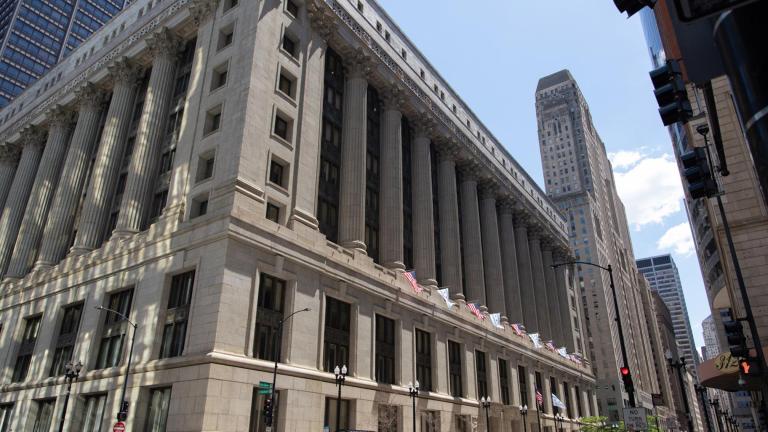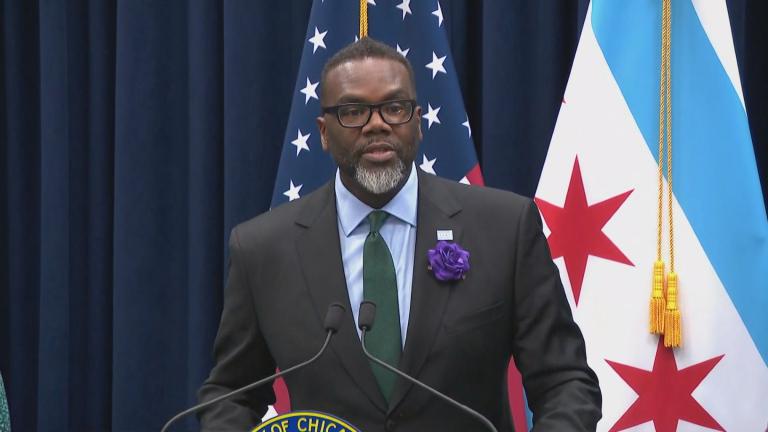Video: Our Spotlight Politics team on pensions, President Biden’s visit to Illinois, the rise in Chicago gun violence and more. (Produced by Alex Silets)
Chicago’s pension debt soared by approximately $1.1 billion in 2020, according to the city’s audited annual financial report for 2020.
In all, Chicago owes $32.9 billion to its four employee pension funds representing police officers, firefighters, municipal employees and laborers, according to the 2020 Certified Annual Financial Report. That is an increase of nearly 3.5% from 2019, according to the report.
The growth of the city’s pension debt slowed slightly between 2019 and 2020 as compared with the previous year, when it grew 5.6%.
Chief Financial Officer Jennie Huang Bennett said that growth was “fully anticipated” because the city is now required to contribute to its pension funds based on actuarial estimates. That requirement, which took full effect in 2020, has helped balloon the city’s structural deficit.
That law is designed to force the city’s pensions to be funded at a 90% level by 2045, ensuring that funds can pay benefits to employees as they retire.
Even as that law takes effect, the city’s pension funds remain significantly underfunded, according to Chicago’s Annual Comprehensive Financial Report for 2020. The Municipal Employees Retirement Fund was the only one to see a slight drop in its funding level between 2019 and 2020, while the other three funds saw their financial condition improve slightly during the past year.
According to the report, the firefighters’ fund has the lowest funded level of the four, at 19%; the laborers’ fund has the highest funded level, at 44%.
The city’s pension funds were buoyed by a 10% increase in investments, allowing the funds to keep pace with scheduled increases in salary and benefits for employees, Huang Bennett said.
Mayor Lori Lightfoot in May told investors at a city-hosted conference that pension debt is “the biggest problem” facing Chicago’s finances and vowed to “force a reckoning” in Springfield.
But Lightfoot has not mentioned the city’s pension debt since then, and has not offered any specific proposals to change the state’s pension system, which can only be changed with an amendment to the Illinois Constitution.
In August 2019, Lightfoot called the annual cost-of-living increases built into the city’s pension payments “unsustainable” and faced a firestorm of criticism from organized labor.
In 2021, the city will pay its four pension funds $1.8 billion, approximately $91 million more than in 2020, from its $4 billion general operating fund, according to the city’s spending plan.
In 2022, Chicago will have to pay $2.25 billion toward those funds, according to the city’s budget projections. Updated projections are expected to be released in August.
The annual financial report closes the book on fiscal year 2020 for the city of Chicago and documents the massive budget crater caused by the COVID-19 pandemic, which shut down the city’s economy completely from mid-March to early June, with many businesses forced to close again amid a second surge that peaked in mid-November. A third, less severe surge kept restrictions designed to stop the spread of the virus in place until mid-June.
The unemployment rate in Chicago peaked at 18%, city officials said. In all, the city took in $405.5 million less than officials expected into its general fund, which it uses to pay for most city services, according to the report. In all, the pandemic opened an $886 million gap in the city’s budget, according to the report.
The pandemic also wreaked havoc in 2020 at both Chicago airports, which saw travel grind to a halt. Revenue at O’Hare International Airport dropped by approximately 28%, while revenues at Midway International Airport dropped 17.5%, according to the report.
However, buoyed by $1.4 billion in aid from the federal government, the city ended the year with $197 million in cash on hand, $12 million more than expected, Huang Bennett said.
In addition, the city paid off $211 million in debt in 2020, a fraction of the city’s overall debt burden, Huang Bennett said.
Contact Heather Cherone: @HeatherCherone | (773) 569-1863 | [email protected]








